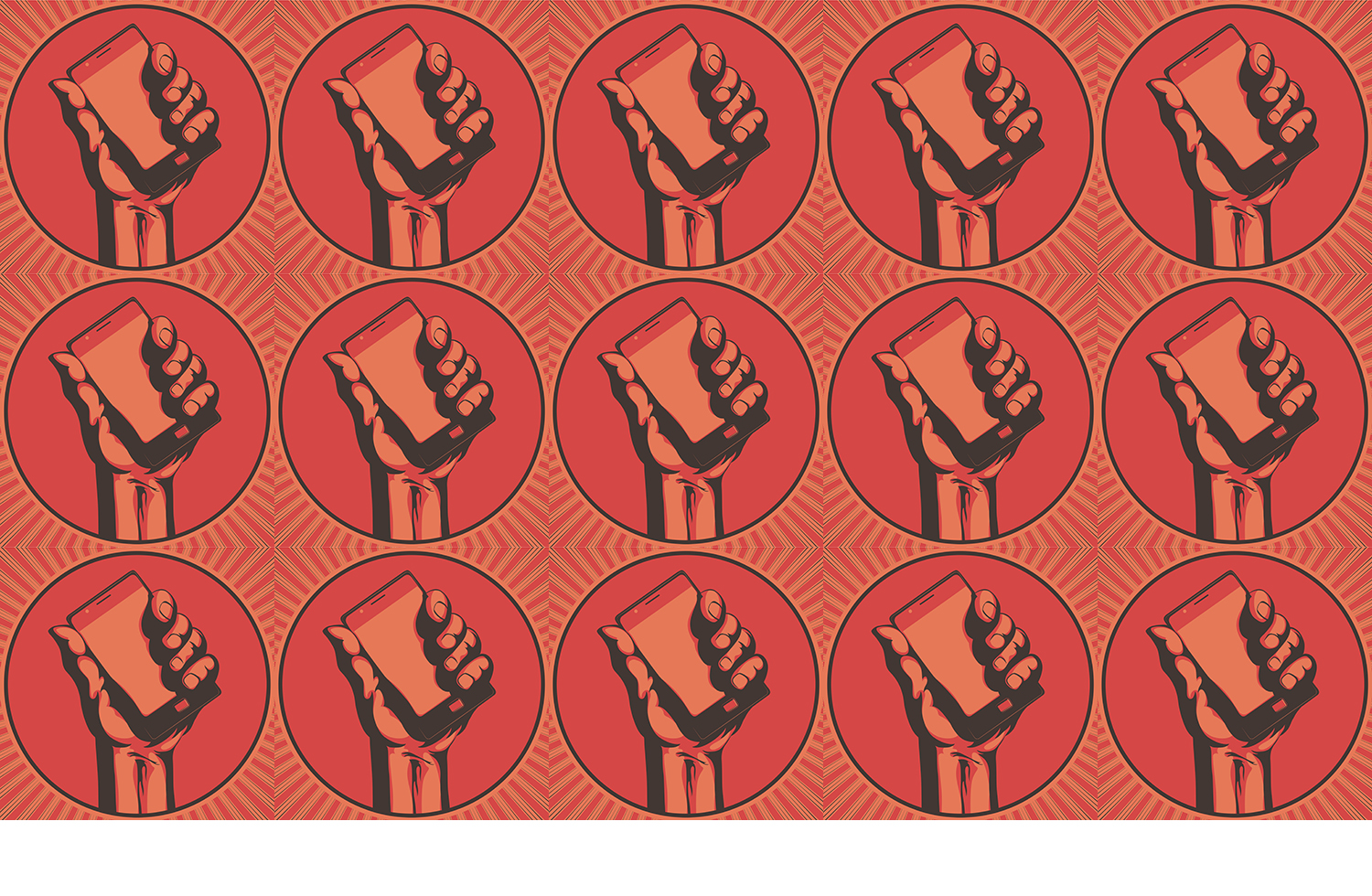The rising revolt against customer surveys
If companies want our "valuable feedback," shouldn't they compensate us for our valuable time?


A free daily email with the biggest news stories of the day – and the best features from TheWeek.com
You are now subscribed
Your newsletter sign-up was successful
It's not enough that I pay Verizon nearly $90 per month for internet access. No, they also want my "valuable feedback." That's why they emailed me a customer survey on March 18. "Please take a moment to answer a few short questions so we can be sure to provide you with the best service possible," said the email, signed by the cheerful-sounding "Verizon team."
"Dear Verizon team," I wrote back, "I'd be happy to provide feedback, but I charge $20 per survey. Is my opinion valuable enough for you to pay my going rate?"
No response.
The Week
Escape your echo chamber. Get the facts behind the news, plus analysis from multiple perspectives.

Sign up for The Week's Free Newsletters
From our morning news briefing to a weekly Good News Newsletter, get the best of The Week delivered directly to your inbox.
From our morning news briefing to a weekly Good News Newsletter, get the best of The Week delivered directly to your inbox.
Until, that is, I got the same survey request again, exactly one month later.
"Dear Verizon," I wrote back, doing my best impression of the world's most naïve customer. "As I mentioned before, I charge $20 per customer survey. If you're not willing to pay me for my time, I'm not willing to fill out a survey. The fact that I've already told you this information gives me the impression that no one is reading these emails."
This time, a response. "Thank you for contacting us," the message began, sounding a hopeful tone. But then, a negative turn: "You replied to an email address that does not accept incoming messages." Worse, this one wasn't from the "team," but rather the more austere-sounding "customer support."
I've been on this quixotic adventure for about six months now — asking innocently for a little bit of compensation for completing surveys. Whether it's Sprint asking me how my phone service is going, or United Van Lines asking me how my recent move went, I've shown a willingness to give my "valuable feedback" under one condition: Pay me for my time.
A free daily email with the biggest news stories of the day – and the best features from TheWeek.com
As it turns out, I'm not alone in my demands. This sentiment is echoed by a growing number of consumers who are starting to question why, in their increasingly busy lives, they are answering surveys for free. According to one study, phone survey cooperation rates have plummeted from 43 percent in 1997 to 14 percent in 2012. Online survey responses rates are even lower, with some studies showing participation rates averaging 2 percent.
Experts are also starting to notice resistance to surveys promising a discount of dubious value or a remote chance — sometimes literally one in a million — of winning a prize. "Response rates in general have been dropping for the 35 years that I have been doing surveys," says Dr. A. Dwayne Ball, department chair and associate professor in the Department of Marketing at the University of Nebraska.
So why are companies so obsessed with surveys in the first place? The practice is deeply ingrained in our culture, going back at least to the Roman Empire. In more recent times, as scientific methods developed, surveys became the data collection method of choice for government, academia, and businesses. Response rates peaked between 1960 and 1990, followed by a precipitous fall, partly because of the exponential rise in survey requests in the internet era. One survey firm, ForeSee, conducts about a million surveys per month. Meanwhile, Mindshare Technologies conducts 60 million surveys every year — that's a mind-boggling 175,000 per day.
The reliance on survey data stems from the idea that a collective answer is more reliable than an individual answer, because an individual person might have ulterior motives for answering a certain way. When participation rates were high, and requests were less frequent, businesses could generally trust the data. But when participation rates declined, businesses didn't shift to different methods of collecting data. It seems that once you start taking surveys, you can't stop. There are at least two reasons for this phenomenon: First, survey data is already embedded in the salary and bonus structure for many CEOs. Second, CEOs usually want a year-to-year comparison of survey data. Who's going to be the first person to say, "We don't need to know how people's answers to these questions changed from last year"?
As anyone who has taken an introductory statistics class can tell you, data suffers when participation rates fall. Just how bad is the data gathered from free surveys? Think of it this way: As fewer people respond to surveys, answers become increasingly skewed toward the extreme ends of the spectrum — either ecstatically elated or wrathfully resentful, with nothing in between.
"People have a wide variety of reasons for refusing to respond to a survey," Ball says. "If any of those reasons are linked to the answers they would have given to any of the survey questions, then there is a problem with biased statistics for those survey questions."
One obvious solution would be to pay people with money or gift cards for valuable feedback, an arrangement used by companies such as LinkedIn. This "incentive" method not only compensates busy people for their time but also yields higher response rates and better data. Unfortunately, businesses aren't getting the message, so the bombardment of free, no-incentive survey requests continues unabated.
It should be noted that some people actually enjoy taking customer surveys. Hannah Mowery, a homemaker in Savannah, Georgia, regularly takes three- to four-minute surveys that offer the chance of winning a prize. "I always think, 'Maybe this time!' And it's never happened. Maybe I'm too optimistic," she says.
Other people, especially those who do survey research themselves, feel a kind of obligation. "I try to take as many customer surveys as I'm offered," says Nicole Staricek, a doctoral candidate in communication at the University of Kentucky. "I believe in survey karma and never know when my research will ask people to reciprocate the favor."
But the population at large seems to have grown weary of taking surveys for little or nothing in return. "I have heard the phrase 'feedback fatigue,' about constant requests to evaluate services like flights and hotel stays," says Dr. Frederick Conrad, a cognitive psychologist and research professor in the Survey Research Center at the University of Michigan.
Another problematic trend is the pressure employees place on every customer to give them a good rating. Because frontline employees are often evaluated based on surveys about consumers' experience with them, such employees often plead for a positive grade. "I am particularly troubled by what is clearly electioneering in these so-called surveys," Conrad says. For example, when hotel desk clerks alert a customer to an upcoming survey request, they often say something like, "I hope we can count on you for all 5's," he says.
"This is clearly not about eliciting unbiased information to improve service," Conrad says.
If these free surveys not only take advantage of people's time but also yield poor data, is it finally time for a consumer revolution? Is it time to start demanding payment in return for valuable feedback?
Craig Lambert thinks so. "Companies are just assuming they can help themselves to our time," says Lambert, author of Shadow Work: The Unpaid, Unseen Jobs That Fill Your Day. "Americans tend to be cooperative people. And they will dish out that time without asking, 'Is this what I want to be doing? Am I really getting anything for this?'"
Lambert imagines the typical company's response to that question would be: "Sure, you are helping us improve our customer service and you're making us a better organization that will provide better products and services to you." But Lambert has his doubts. "I have a feeling that most of the information is more valuable to the marketing side and it's being collected for that reason," he says. "It's more about selling more products than improving the products that are delivered."
Like Lambert, tech pioneer Jaron Lanier, author of You Are Not a Gadget and Who Owns the Future, also questions the current system in which companies expect free feedback from busy people. "One problem with surveys is that they promote and even cement the proposition that ordinary people perform services for barter, while a special, anointed, tiny minority perform services for capital," Lanier says. "The ordinary person is supposed to act as an unpaid analyst, and benefit from the company's improvement, while the company gains actual wealth."
A note of caution: If you're joining me in my campaign to end free survey work, be ready for some pushback. Some companies are not amused when you ask them for money in return for labor. Case in point: In July, I got a survey request from a paid cloud app that I use, telling me my input is "incredibly valuable." The email even said I could reach the co-founder, Adam, directly.
So I contacted Adam. "This might sound unusual," I began, "but I actually have a new policy with surveys. I charge money for each survey I complete. Would you be willing to compensate me for my time?"
Considering the fact that I was reaching a co-founder, I decided to give him a discount from my usual $20 fee. "I'd be willing to do it for just a few dollars," I wrote.
"Thanks but no thanks," he wrote back. "We've already received hundreds of answers from people genuinely trying to make the product better for themselves."
He could have left it at that, but he wanted to teach me a lesson. So he compared me negatively to the well-behaved customers willing to do his survey for free: "I think they appreciate that we're going to be spending hundreds of thousands of dollars of development hours into making the experience better. Telling us how we can make it better just benefits them in the end."
And then, in a statement that seemed intended to reassure himself more than anything else, he concluded the email by saying: "You get a special quality of feedback when people answer from intrinsic motivation and not a few dollars."
-
 How the FCC’s ‘equal time’ rule works
How the FCC’s ‘equal time’ rule worksIn the Spotlight The law is at the heart of the Colbert-CBS conflict
-
 What is the endgame in the DHS shutdown?
What is the endgame in the DHS shutdown?Today’s Big Question Democrats want to rein in ICE’s immigration crackdown
-
 ‘Poor time management isn’t just an inconvenience’
‘Poor time management isn’t just an inconvenience’Instant Opinion Opinion, comment and editorials of the day
-
 The pros and cons of noncompete agreements
The pros and cons of noncompete agreementsThe Explainer The FTC wants to ban companies from binding their employees with noncompete agreements. Who would this benefit, and who would it hurt?
-
 What experts are saying about the economy's surprise contraction
What experts are saying about the economy's surprise contractionThe Explainer The sharpest opinions on the debate from around the web
-
 The death of cities was greatly exaggerated
The death of cities was greatly exaggeratedThe Explainer Why the pandemic predictions about urban flight were wrong
-
 The housing crisis is here
The housing crisis is hereThe Explainer As the pandemic takes its toll, renters face eviction even as buyers are bidding higher
-
 How to be an ally to marginalized coworkers
How to be an ally to marginalized coworkersThe Explainer Show up for your colleagues by showing that you see them and their struggles
-
 What the stock market knows
What the stock market knowsThe Explainer Publicly traded companies are going to wallop small businesses
-
 Can the government save small businesses?
Can the government save small businesses?The Explainer Many are fighting for a fair share of the coronavirus rescue package
-
 How the oil crash could turn into a much bigger economic shock
How the oil crash could turn into a much bigger economic shockThe Explainer This could be a huge problem for the entire economy
